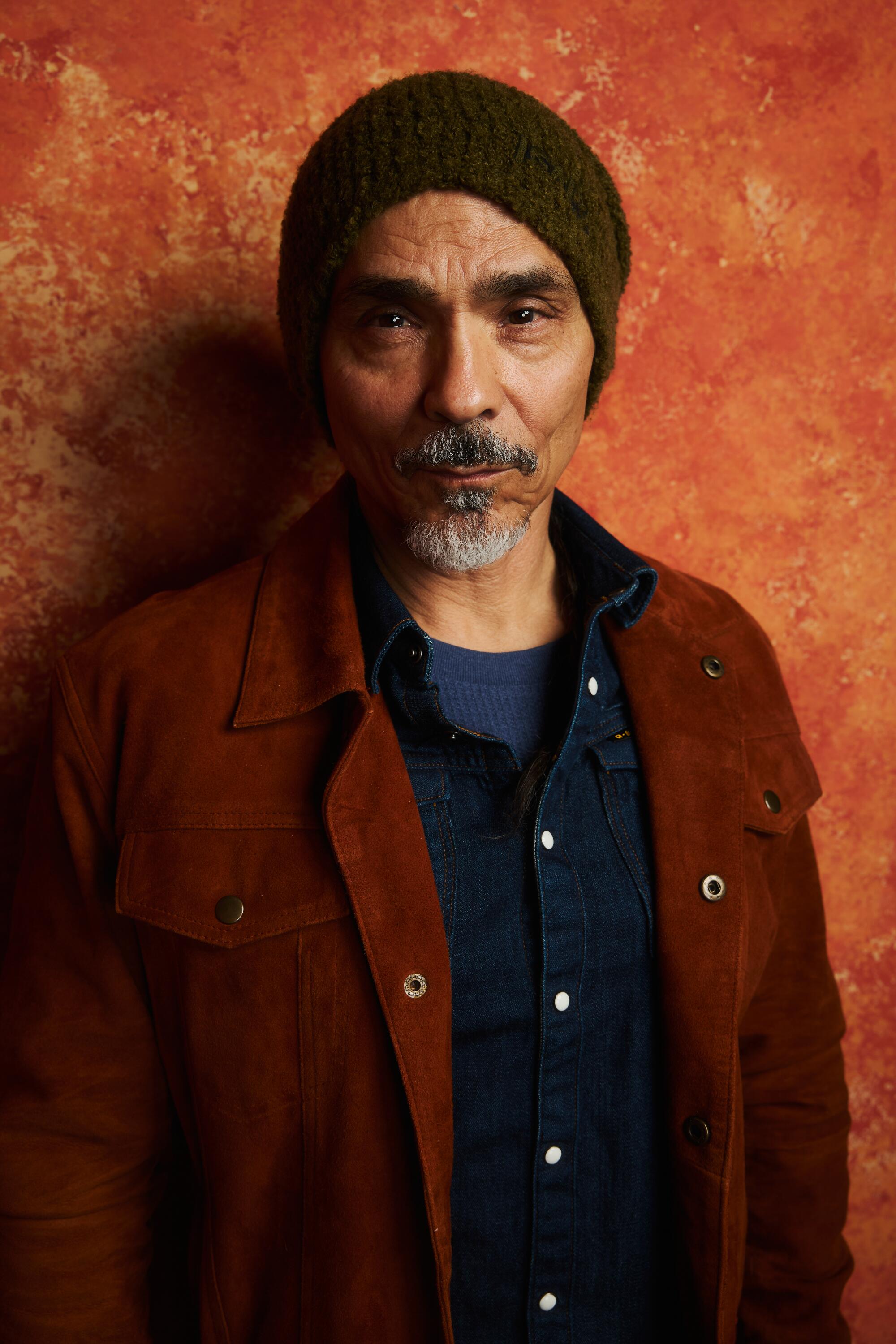
- Share via
He may have started the third season of “Dark Winds” crawling across the desert in the dead of night with a wounded leg and a dart stuck in his neck, but for Zahn McClarnon’s Joe Leaphorn, things can always get worse. “There’s a lot at stake for Joe,” said McClarnon, whose Navajo police lieutenant contends with marital discord, childhood trauma and a pesky FBI investigation. “He’s made some mistakes and the people around him are suffering because of it. Not only can he lose his wife, played by the wonderful Deanna Allison, but he can also lose his freedom.”
The AMC series, based on the Leaphorn & Chee novels by Tony Hillerman, follows Navajo Nation tribal cops Leaphorn, Jim Chee (Kiowa Gordon) and Bernadette Manuelito (Jessica Matten) in the early 1970s as they solve crimes within a white power structure that routinely devalues the lives of Native Americans.
McClarnon, speaking from Camel Rock Studios in Santa Fe, N.M., took a break from filming “Dark Winds’” fourth season to talk about head trips, authenticity and the power of understatement.
‘Dark Winds’ star Zahn McClarnon and director Erica Tremblay leaned on each other to unpack Joe Leaphorn’s trauma in a ‘safe and beautiful’ way for the Season 3 episode ‘Ábidoo’niidęę (What He Had Been Told).’
In the surreal episode “Ábidoo’niidęę (What He Had Been Told),” Joe gets injected with a ketamine-tipped dart that causes him to revisit a sex abuse trauma from his past. Were those sequences filmed on a closed set?
The director, Erica Tremblay, closed the set down for one scene specifically, when I’m dealing with the priest and my young cousin. It was great to be around collaborators who made me feel safe in these vulnerable moments. I could relate, since I’ve had events in my past very similar to what Joe’s going through.
Sorry to hear that.
No, it’s OK. It certainly doesn’t define me. But it’s the first time in my career where I walked into my producer’s office at one point and broke down a little bit because I was having a hard time with those blurred lines between reality and pretending.
Joe’s also trying to solve the murder of a Navajo boy while Jenna Elfman’s FBI agent looks into the mysterious Season 2 death of mining mogul B.J. Vines.
When Joe left B.J. Vines in the desert to die, he kind of did [to him] what happened to the Navajo people in the 1800s when the government put them on “the Long Walk.” A lot of them starved to death, having to walk hundreds of miles in bare feet in the middle of winter. That was Joe’s justification: “OK, you can make it back to civilization on your own.” As a Navajo man, as a principled man, Joe finds himself in turmoil over that decision.
You’re No. 1 on the call sheet and most of your scenes are pretty intense. How do you decompress?
Usually after a season, I go up to my mom’s house in Nebraska and hang out with her. I’m 58 years old and a lot more healthy now than I was in my earlier life, when I struggled with addiction. I finally got clean and sober 25 years ago, with help from a lot of people, when I had my big moment of clarity — that I deserved more than what I was doing to myself. I use those experiences in my acting today.

Your mom, who’s Lakota and your dad, who’s white, raised you and your twin brother in Montana near Glacier National Park. How did you find your path into acting?
My dad would take us every Friday to films at the drive-in. Seeing “Three Days of the Condor,” “Little Fauss and Big Halsy,” “Dog Day Afternoon” — that sparked something in me, though I didn’t realize until later on that it was this desire to express myself. Acting gave me purpose.
In 2015, you made a big impression in “Fargo” as the soft-spoken hitman Hanzee Dent. Like most of your characters, he exudes strength through restraint. That approach clearly works for you.
The Al Pacino I saw in “The Godfather” was so understated, he didn’t have to do much. [I admire] that kind of acting. For me, a lot of this stuff is internal and I guess it just comes out through your eyes. I know when I’m being honest and when I’m not being honest, and usually, when I’m “big,” it’s not honest.
You recently appeared in “Reservation Dogs,” co-created by a Seminole Nation citizen, Sterlin Harjo, and you serve as an executive producer on “Dark Winds.” It must be heartening to make shows that put the Native American experience front and center.
It’s critical that Native kids are finally seeing themselves on films and TV in an authentic, positive way. With “Dark Winds,” even though Tony Hillerman was a white guy, we’ve recontextualized his books with a Native writers’ room, Native consultants, Native actors, Native directors. “Dark Winds” is opening doors for people to see us in a different way than they’ve ever seen us before.
More to Read
Sign up for The Envelope
Get exclusive awards season news, in-depth interviews and columnist Glenn Whipp’s must-read analysis straight to your inbox.
You may occasionally receive promotional content from the Los Angeles Times.







